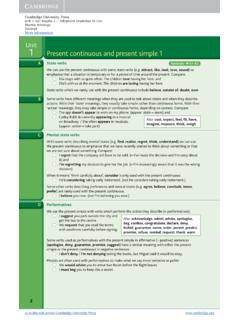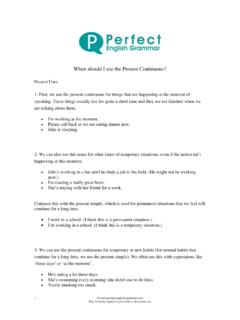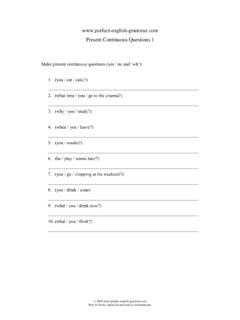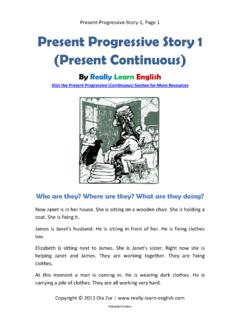Transcription of THE PRESENT CONTINUOUS TENSE - unifg.it
1 THE PRESENT CONTINUOUS TENSEWhat is he doing?He s playing football PRESENT progressive puts emphasis on the course or duration of an , WHAT ARE YOU DOING?I M FLYING !!!THE PRESENT CONTINUOUS TENSEIam mplayingYouWe Theyare reHeSheItis sAFFIRMATIVE: PlayTHE PRESENT CONTINUOUS TENSEIs he playing football now? No, he isn t. He is PRESENT CONTINUOUS TENSEINTERROGATIVE:PlayNEGATIVE: PlayAmIplaying?AreyouwetheyIshesheitIam not m notplayingYouWe Theyare notaren tHeSheItis notisn tWHAT IS SHE DOING?drawShe is drawing a + ing (spelling rules)listen + ing = listeningdie (-ie y)+ ing = dyingwrite+ ing = writinghop+ p+ ing = hoppingtravel+ l+ ing = travellingMake ingforms of each verb ingformsbeginningrubbinglisteninglyingsw immingstudyinghappeninggettingusingadmit tingtryingdecidingcomingputtingA single, silent eat the end of the word is dropped before : come comingBut: eeat the end of the word is not changedexample: agree agreeingThe final consonant after a short, stressed vowel is doubled before ing.
2 Example: sit-sittingThe final consonant after the second stressed syllable is doubled before ing: example: begin-beginningThe letter l as final consonant after a vowel is always doubled before ing. example: travel -travellingMind: This applies only for British English; in American English there is usually only one ieat the end of a word becomes ybefore : lie -lyingThe PRESENT CONTINUOUS TENSE is used which are happening at or around the moment of speaking. NowI mdoingthe washing up. She is workingvery hard situations. I mstayingwith a friend at the THAT ARE HAPPENINGAT PRESENT (1)They are dancing right SITUATIONS (2)They normally play this week they are skating.
3 THE PRESENT CONTINUOUS TENSETIME EXPRESSIONS:Now, at the moment, today, nowdays, this are throwing snowballs nowPresent Simple or PRESENT CONTINUOUS ?1. (You / come) _____ tonight?2. (He / eat) _____ rice every day?3. I (work) _____ at the (He / come) _____ to London often?5. He (play) _____ tennis (You / come) _____ to the cinema later?to the party 7. They (not / come) _____ to the He (not / play) _____ golf (You / play) _____ tennis this Sunday?10. They (go) _____ to a restaurant every She (not / go) _____ to the cinema very :1. Are you coming tonight?2. Does he eat rice every day?3. I am working at the Does he come to London often?
4 5. He is playing tennis Are you coming to the cinema later?7. They aren't coming to the party He isn't playing golf Are you playing tennis this Sunday?10. They go to a restaurant every She doesn't go to the cinema very often.



